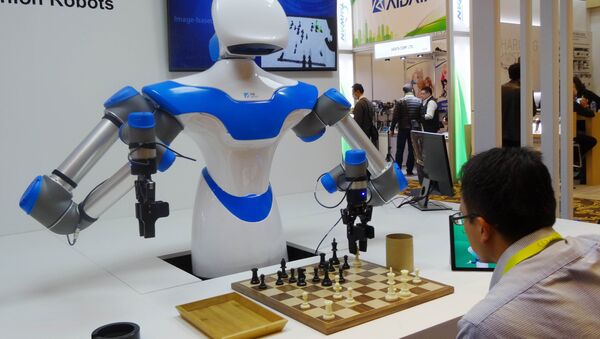According to the professor in order to understand this proposal one needs to look at corporations. Corporations today carry legal responsibility but they aren’t recognized as having human rights or seen as individuals.
“In the same way robot may be treated like that in the proximate future. Even in that case the European Parliament is not talking about all sorts of robots but just about some devices, where it might be reasonable to treat them as something close to a corporation,” Bertolini told Sputnik.
Hence, according to the professor the draft should be looked as not a comparison of robots to human beings but rather a comparison of them to corporations.
Talking about the legal framework and how robots can be held accountable for their actions, the professor said that, “The idea is very clear in the document of the
He further said that ultimately there would always be a human being behind a robot that would bear the economic consequences of the harm that the machine may inflict.
“Otherwise you would expect either the producer or the owner of the machine to be held accountable for the damages that the machine cost,” the professor said.
He further spoke about the future in which robots will be a part of human lives and various perspectives that people will have to look at when integrating robots into their own world.
“Most people will agree that you can only consider something as a being when that thing can actually decide for itself as to what it wants for itself and can pursue a goal for itself that which itself decides. Robots of today are made and programmed to serve the purposes of human beings and we are far away from creating a device that can actually determine its own goal,” Bertolini said.
He said to look at robots from instrumental perspective just as people look at corporations, because corporations have a right to cash flow and have obligations toward other corporations and other human beings.
The draft report, tabled by Mady Delvaux-Stehres, states that the current rules are “insufficient” for what it calls the “technological revolution”, and suggests the EU should establish “basic ethical principles […] to avoid potential pitfalls".
The resolution was easily passed by the European Parliament’s legal affairs committee and a vote by the full parliament is set to take place in February. Delvaux stated that a rising number of areas in human beings lives are being affected by robotics hence there is an urgent need to create a legal framework for them.
The adopted paper also proposes for new robots to undergo a registration procedure, to consider the creation of an EU agency on robotics and to design specific rules for a series of various AI designations, such as autonomously piloted cars, medical care robots and artificial organ replacements.
Sales of robots rose by 29 per cent in 2014, compared to an average of 17 per year between 2010 and 2014. Annual patent filings for robotics technology have tripled over the past decade.
There is also a rising demand for the driverless vehicles which according to academics could reduce the number of road accidents by up to 90 per cent.
However, skeptics have raised concern that a robot driver might crash and kill occupants inside the vehicle in order to avoid killing more people outside the car. Hence, implementation of robots into human lives still requires some thorough understanding of the technology, its strengths and pitfalls.
Have you heard the news? Sign up to our Telegram channel and we'll keep you up to speed!




